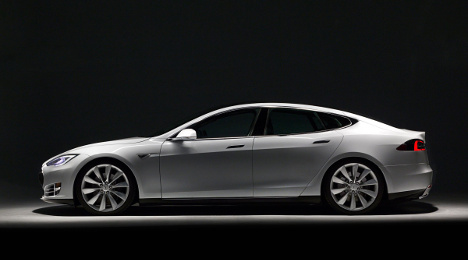Tesla CPO: The Question of Price

Tesla Model S
By subscribing, you agree to receive communications from Auto Remarketing and our partners in accordance with our Privacy Policy. We may share your information with select partners and sponsors who may contact you about their products and services. You may unsubscribe at any time.
PALO ALTO, Calif. –
When Tesla confirmed rumors of a new certified program last week, it was evident the company had given some thought to sourcing the new program.
The automaker is giving Tesla Model S owners the option to return the car after three years and recover 45 to 50 percent of its sticker price.
And with the first generation Model S nearing the 3-year-old mark, these returns will help to populate the new CPO program.
That said, the question remains — what will Tesla CPO shoppers be expected to shell out for these certified models?
According to ALG, Model S vehicles are depreciating 20 percent to 25 percent during the first year of ownership, slightly lower-than-average for such a luxury, niche vehicle.
Jack Nerad, executive editorial director and executive market analyst for Kelley Blue Book’s KBB.com, told Auto Remarketing this is most likely due to limited supply and may be due for a market correction as the number of Tesla vehicles on the road grows.
Subscribe to Auto Remarketing to stay informed and stay ahead.
By subscribing, you agree to receive communications from Auto Remarketing and our partners in accordance with our Privacy Policy. We may share your information with select partners and sponsors who may contact you about their products and services. You may unsubscribe at any time.
“Depreciation on ‘hot’ vehicles that are in limited supply is typically lower than on vehicles that are not in as high demand in the market and whose supply is less restrained,” said Nerad. “That is the situation in which Tesla finds itself. Typically, as supply catches up with demand, depreciation trends toward a more normal rate, although there are significant differences in depreciation brand-to-brand.”
Even if depreciation rates normalize in the coming years for the Model S, the CPO pricing question is bound to play out a bit differently than with other luxury counterparts, such as Mercedes-Benz and BMW.
Bottom line, Tesla’s unconventional retail sales model changes the game a bit.
Edmunds.com senior analyst Ivan Drury explained that the way the Tesla retail model is set up puts them in a place where they can potentially “control” the CPO market for the Model S, including price.
“You are only going to be able to buy the CPO Model S at the Tesla showrooms. On top of that, if they are the ones controlling the majority of their market by offering this program with such a niche vehicle, I would assume they could almost command the market,” said Drury.
“They could control the roll out of used vehicles, and some could sit in reconditioning. They might cherry-pick others. So when you combine the idea that it is a used market but they are going to take the best of the best, and if they have the majority of them, it would be very easy for them to set a price with no negotiation, in that sense,” he continued.
The question is this: is Tesla going to come up with a condition and mileage matrix to price their CPO models or rather go with pricing every vehicle individually based on market and technician review?
“Right now, if a vehicle is in California versus Florida, it will have a different price, but with Tesla models, it could be different. They are known for doing things a bit differently,” said Drury.
That said, with the latest moves into the leasing and used market, Tesla is looking a bit more like a traditional automaker.
The automaker’s moves toward mainstream may improve industry perception of the brand as its direct-to-consumer sales model has been causing waves among new-car franchised dealers for years now.
“When I first heard the news, I thought, this is kind of odd, because we have seen them as the forefront, changing everything — but now they are relying on traditional means to move the metal. They have advanced technology and advanced cars using initially a very disparate view of selling vehicles,” said Drudy. “But they are now tacking on things that are very traditional and very in line with what other automakers are doing. It does blend these together more. As far as perception goes, it definitely makes them a little more mainstream.”
Michelle Krebs, director automotive relations at Cox Automotive and senior analyst at AutoTrader.com, went so far as to say that as Tesla grows, it is evident the automaker is finding there are some advantages to tradition.
“As we saw with the D announcement, Tesla plans to offer all-wheel-drive and some technologies that could lead to autonomous driving — many of those already in the market by other luxury makers,” she explained.
Although the company’s leasing and used program are reminiscent of programs offered from more mainstream automakers, chances are their new-car sales model will continue to battle legal concerns from franchised dealers.
As Krebs points out, it’s not just about Tesla.
“Tesla will remain under fire for some time with franchised dealers for its direct-to-consumer model. And this is not just about Tesla,” she said. “Franchised dealers — and manufacturers — are concerned that the direct-to-consumer model will be allowed to other newcomers, including Chinese automakers.”
News of Tesla's CPO program was first confrmed in an Automotive News story.
This is the third installation of a three-part series highlighting Tesla’s new CPO program. The first installation focused on sourcing Tesla’s CPO program. The second article studies whether the CPO program will serve to expand Tesla’s audience.


